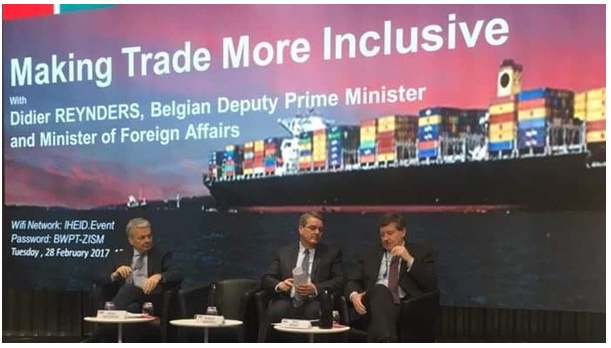Didier Reynders, Belgian Deputy Prime Minister and Minister of Foreign Affairs, Roberto Azevêdo, Director-General of the WTO, and Guy Ryder, Director-General of the ILO, discussed ways to make trade more inclusive, including labour provisions in trade agreements. This was followed by a debate by a panel of experts on labour and trade. Below is an article with impressions and elements of the discussions.
Deputy Minister Reynders drew attention to the tendencies of increasing scepticism towards multilateralism, and a lack of faith in international organizations and free trade, due to unemployment and changes in the labour market. It is important that legitimate concerns are taken seriously, because the importance of a rule-based global system cannot be overstated. To ensure sustainable growth and development, labour provisions need not only to be included in trade agreements, but also effectively implemented. This is best encouraged by a cooperative approach, rather than through sanctions. Trade is an important means to development, and Reynders further stated that Belgium supports enhancing the inclusiveness of trade.
The ILO informed that it has conducted a study based on over 200 trade agreements reported to WTO. Trade related labour provisions have become more commonplace and comprehensive over the last two decades. The report from the study shows that inclusion of labour provisions in trade agreements has increased labour marked participation for women, and contributed to narrowing the gender pay gap. In addition, the study shows that labour provisions have not had a negative impact on trade flows.
DG Azevêdo pointed to the development in technology as making a more significant contribution to unemployment than the increasing international trade. A protectionist approach will not improve labour market participation, but rather reduce the purchasing power of consumers. Concerning trade contributing to reducing poverty, inclusivity is the key word. Azevêdo emphasized the importance of cooperation between the WTO and the ILO to ensure that trade and labour polices can complement each other. Trade plays an important role in creating new jobs, and estimates show that the implementation of the Trade Facilitation Agreement, which recently came into force, can create up to 20 million jobs.
The relationship between the ILO and the WTO was also addressed by DG Ryder. While there has been tendencies of institutional barriers between them, the organizations have undertaken joint studies in recent years, and see a common purpose in their work on trade and employment. Using the word inclusive to describe international trade has increased. Inclusivity is an important aspect of sustainable development globally, and it is mentioned in several of the UN Sustainable Development Goals. As the world has seen an increase in international trade, the gaps in national averages of income per person have narrowed. Yet, looking at income distribution within most countries, the gaps between top and bottom have widened. Ryder put emphasis on the importance of the efforts of the ILO and the multilateral system as a whole to help generate a pattern of inclusive growth, based on open markets.
Based on the ILO study on labour provisions, the panel of experts discussed the challenges relating to the changes in the labour market due to increased international trade and the development in technology. Marva Corley-Coulibaly, who coordinated the ILO-report, addressed the influence of trade on employment. While adaptions in the labour market due to an increase in trade has led to both losses and gains of jobs, the jobs created often demand other and more specific qualifications than the jobs lost. This means that a worker’s transition from one sector of work to another is not necessarily as smooth and quick as some theories assume.
In developing countries, the increase in trade has had the impact of increasing the employment of underrepresented groups in the labour market, such as women and young people. To make sure the jobs created from increased trade are decent, the activities and technical assistance provided by the international community are essential. It was evident from the debate that along with the use of labour provisions, this can contribute to making trade more inclusive.
To read more, visit:
- Didier Reynders’ speech: http://diplomatie.belgium.be/fr/newsroom/nouvelles/nieuwsberichten/2017/discours_du_ministre_reynders_au_graduate_institute_geneva
- Guy Ryder’s speech: http://www.ilo.org/global/about-the-ilo/how-the-ilo-works/ilo-director-general/statements-and-speeches/WCMS_546215/lang--en/index.htm
- Roberto Azevedo’s speech: https://www.wto.org/english/news_e/spra_e/spra159_e.htm
- The report from ILOs study on labour provisions in trade and investment: http://www.ilo.org/wcmsp5/groups/public/---dgreports/---dcomm/---publ/documents/publication/wcms_498944.pdf
